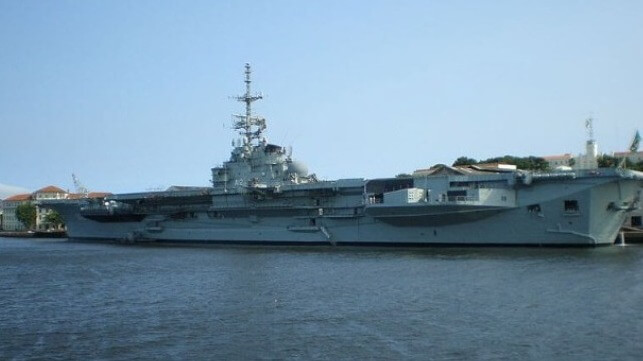Tow for “Toxic” Aircraft Carrier Reverses Course Back to Brazil

Turkish officials confirmed today that the decommissioned Brazilian Navy carrier NAe São Paulo which was to have been dismantled at Aliaga has reversed course and is now heading back to Brazil. The tug towing the carrier changed its AIS signal now showing that they will arrive back in Rio de Janeiro on October 2. The two-month roundtrip is a similar fate to her sistership the French aircraft carrier Clemenceau which was also turned away by the Indian government in 2006.
Writing that the will of the Turkish people was being honored, Ednan Arslan, a member of the Turkish parliament confirmed the reports that the carrier was returning to Brazil. He Tweeted an image of the AIS ending two weeks of speculation and initially a standoff between Brazil and Turkey.
Like her sistership, the issue for the NAe São Paulo became the question of the presence of toxic materials aboard the carrier and if a proper inspection had been done before the sale to the breakers. Last year, Brazil auctioned the carrier, which had been decommissioned in 2018, with reports that only one of the eight bids was found to meet the conditions and have the necessary credentials. The carrier departed Rio on August 4, 2022, under tow.
"Nae Sao Paulo" sava? gemisi, rotas?n? güncelledi. Gemi'nin son hedefi Rio de Janeiro Liman?.
— Ednan Arslan (@ednanarslanchp) September 8, 2022
Halk?n tepkisine kar??n bir ?ey yap?lamayaca??n?, hem iktidar hem ç?kar odaklar? art?k anlam??t?r diye dü?ünüyorum. #?zmir #Asbest #NaeSaoPaulo pic.twitter.com/QgqpkIeaNd
Shortly after she departed environmentalists began protesting citing what they believed was a fault inspection of the vessel that reported only minor amounts of toxins aboard. The watchdog organization NGO Shipbreaking reported that only 12 percent of the spaces aboard the carrier had been tested to prepare the report which estimated just 9.6 tons of asbestos-contaminated materials onboard the vessel. The Clemenceau by comparison contained at least 600 tons of asbestos. The report failed to test electrical cabling and said that there was no presence of PCBs. Finally, the NGO contended the carrier had been used by France in the 1960s with atmospheric nuclear bomb testing in the Pacific meaning that it could have radioactive contamination.
Turkey responded by calling for a second inspection of the vessel before it arrived but Brazil said the vessel had already left making it impossible. Two weeks ago, Turkey’s Environment, Urban Planning and Climate Change Minister, Murat Kurum, announced that due to Brazil’s failure to carry out a second audit process that “the Brazilian navy ship NAe Sao Paulo, which will arrive at the ship dismantling facility in Izmir Aliaga, will be sent back.”
The tug towing the carrier was waiting off northern Africa for the past two weeks with reports that the British authorities had denied a permit to transit the Strait of Gibraltar. Media reports indicated that Brazil had agreed that the vessel should return but it had continued to linger off the Moroccan coast.
Commissioned in 1962 as the Foch, the 32,800 dwt carrier (fully loaded) was a sistership to Clemenceau. France operated her for 37 years selling her while she was still in service in 2000 to Brazil where she would have a career troubled by mechanical failures. After a fire in 2012, Brazil had said she would be fully reconditioned, but by 2017 she was listed as demobilized and officially decommissioned the following year.
The Clemenceau had become the center of world attention, including protestors blocking her entry into the Suez Canal, in 2006 when she was turned around after an Indian court ruled that she had to return to France. She was finally dismantled starting in 2009 at a specialized facility in the UK that met international standards for the handling of toxic materials.

that matters most
Get the latest maritime news delivered to your inbox daily.
Top photo by Bernardo Fiusa (public domain)
